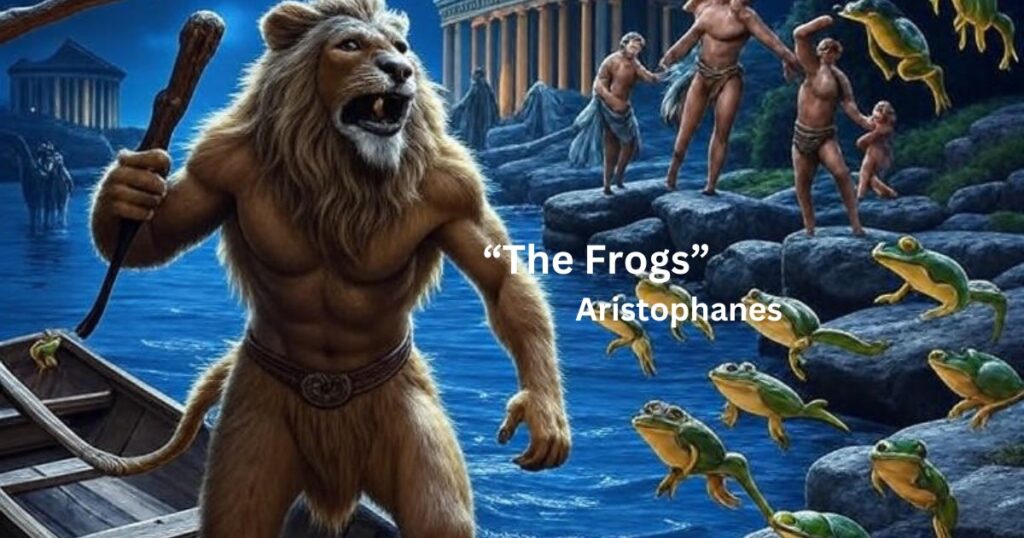Introduction-
Aristophanes’ The Frogs, performed in 405 BCE, is a brilliant Athenian comedy that blends satire, fantasy, and cultural critique. Amid the Peloponnesian War’s turmoil, the play follows Dionysus, the god of theater, on a journey to the Underworld to retrieve the tragic poet Euripides, believing his art can save Athens. Accompanied by his slave Xanthias, Dionysus encounters frogs, gods, and a poetic showdown between Aeschylus and Euripides, debating whose tragedies best serve society. Through humor and absurdity, The Frogs explores art’s role in civic life and the tension between tradition and innovation.
This article offers a comprehensive analysis of The Frogs, delving into its comedic structure, thematic depth, and historical significance. Through scene-by-scene breakdowns, character studies, and stylistic analysis, we’ll uncover how Aristophanes uses laughter to probe serious questions about culture, politics, and morality. The play’s blend of slapstick and intellectual wit makes it a timeless commentary on the power of art, resonating with modern debates about creativity and societal values.
As we explore The Frogs’ symbols, themes, and context, we’ll also consider its enduring influence on comedy and satire. Whether you’re a classics scholar, a theater enthusiast, or new to Greek drama, this article aims to illuminate why The Frogs remains a hilarious and thought-provoking masterpiece. Join me on this journey to the Underworld, where frogs croak, poets clash, and comedy reveals profound truths.
Overview
Summary of the Play
The Frogs centers on Dionysus, the god of wine and theater, who despairs over Athens’ declining tragic drama after Euripides’ death. Determined to restore cultural greatness, he journeys to the Underworld with his slave Xanthias to bring Euripides back. Their quest involves comedic misadventures: disguising as Heracles, dodging croaking frogs, and navigating Hades’ bureaucracy. In the Underworld, Dionysus judges a contest between Aeschylus and Euripides, who debate whose tragedies better serve Athens. Aeschylus, championing tradition, ultimately wins, and Dionysus escorts him back to the living, hoping to revive the city’s moral and artistic spirit.
Expectation Vs Reality
We expected a light, farcical comedy but found The Frogs to be a sharp satire blending lowbrow humor with highbrow cultural critique. Its reputation for lampooning poets prepared me for wit, but the play’s political urgency and philosophical depth surprised me, given its absurd premise.
Reading The Frogs is a rollercoaster of laughter and reflection. Aristophanes’ bawdy jokes and clever wordplay keep you entertained, while the poetic contest sparks debate about art’s purpose. The play’s accessibility, paired with its historical context, makes it both fun and intellectually stimulating, though some references require footnotes.
Thematic and Conceptual Analysis
Scenic Summary
Prologue and Parodos
Summary: Dionysus, lamenting the loss of great tragedians, decides to fetch Euripides from the Underworld, dressed as Heracles. Xanthias, his slave, carries the luggage and trades barbs. The Chorus of Frogs sings a croaking song as they cross the river Styx.
Explanation: The prologue establishes Dionysus as a bumbling, relatable god, setting the comedic tone. The Frogs’ song introduces the play’s playful absurdity.
Critical Discussion & Interpretation: Dionysus’ quest reflects Athens’ cultural crisis, while the Frogs’ chorus symbolizes distraction and chaos, mocking the city’s distractions during wartime. The master-slave banter highlights social dynamics, a staple of Old Comedy.
Episode 1 and Stasimon 1
Summary: At Heracles’ house, Dionysus learns about the Underworld’s dangers. At the river, Charon ferries Dionysus, while Xanthias walks. The Chorus of Initiates sings of mystic rites and mocks Athenian figures.
Explanation: Dionysus’ cowardice and Xanthias’ wit drive the humor, while the Initiates’ ode shifts to a religious tone, satirizing contemporary politics.
Critical Discussion & Interpretation: The Initiates’ chorus critiques Athens’ moral decay, urging a return to traditional values. Dionysus’ incompetence parodies divine authority, reflecting skepticism about leadership during the Peloponnesian War.
Episode 2 and Stasimon 2
Summary: Dionysus and Xanthias swap roles to avoid punishment from Aeacus, the Underworld’s gatekeeper, leading to comic confusion. The Chorus praises honest citizens and condemns corrupt ones.
Explanation: The role-swapping farce highlights identity and status, with Xanthias outsmarting his master. The Chorus’s ode reinforces the play’s call for civic virtue.
Critical Discussion & Interpretation: The swap critiques social hierarchies, suggesting merit over birthright. The Chorus’s satire targets specific Athenians, grounding the comedy in contemporary politics.
Episode 3 and Stasimon 3
Summary: At Pluto’s palace, Dionysus learns of a contest between Aeschylus and Euripides for the throne of tragedy. The poets debate their styles, with Euripides favoring realism and Aeschylus tradition. The Chorus celebrates poetic art.
Explanation: The contest is the play’s intellectual core, with Dionysus as an inept judge. The Chorus’s ode elevates the stakes, framing poetry as a civic force.
Critical Discussion & Interpretation: The debate reflects tensions between innovation (Euripides) and tradition (Aeschylus), mirroring Athens’ cultural crossroads. Aeschylus’ victory suggests Aristophanes’ preference for timeless values.
Episode 4 and Stasimon 4
Summary: The contest continues, with the poets critiquing each other’s verses and weighing their words literally. Dionysus, swayed by Aeschylus’ moral weight, chooses him to return. The Chorus lauds the decision.
Explanation: The absurd “weighing” of poetry parodies literary criticism, while Aeschylus’ victory aligns with the play’s conservative message.
Critical Discussion & Interpretation: The literal weighing mocks Euripides’ verbosity, favoring Aeschylus’ gravitas. The Chorus’s approval reinforces the play’s advocacy for art that uplifts society.
Exodos
Summary: Aeschylus departs for Athens, leaving Sophocles in his Underworld seat. Dionysus and Aeschylus ascend, while the Chorus sings of Athens’ salvation through art.
Explanation: The resolution fulfills Dionysus’ quest, with Aeschylus as a cultural savior. The Chorus’s final ode offers hope amid Athens’ decline.
Critical Discussion & Interpretation: The Exodos blends optimism with irony, as Athens’ real-world fate was grim. Aristophanes uses comedy to inspire reflection on art’s role in healing a fractured society.
Core Themes
- Art and Society: The play examines whether art should innovate or uphold tradition, questioning its civic responsibility.
- Tradition vs. Innovation: Aeschylus’ victory over Euripides reflects a preference for timeless values amid cultural upheaval.
- Political Satire: Aristophanes critiques Athens’ leadership and moral decay, using humor to advocate reform.
Underlying Messages
Aristophanes suggests that art shapes society’s moral fabric, urging Athens to embrace traditional values to survive its crisis. Humor, as a persuasive tool, makes these critiques palatable, encouraging reflection without alienation.
Symbolism and Metaphors
- Frogs: Represent chaos and distraction, contrasting with the play’s call for focus and virtue.
- Underworld: Symbolizes Athens’ moral and cultural decline, with the quest for a poet as a search for redemption.
- Poetic Contest: Metaphor for the broader debate over Athens’ identity and future.
Relevance to Contemporary Issues
The Frogs resonates with modern debates about art’s societal role, such as whether media should prioritize entertainment or moral guidance. Its satire of leadership mirrors critiques of contemporary politics, while the tradition-innovation tension applies to cultural shifts in the digital age.
Structural and Stylistic Analysis
Narrative Structure
The Frogs follows the structure of Old Comedy: prologue, parodos, episodes, parabasis (choral address to the audience), and exodos. The linear quest narrative is punctuated by choral odes and comedic set pieces, balancing plot with satire. The poetic contest serves as a climactic debate, resolving the central conflict.
Writing Style & Tone
Aristophanes’ style is irreverent and versatile, blending crude humor, puns, and poetic lyricism. The tone is playful yet pointed, using absurdity to deliver sharp social commentary. Choral odes shift to a more serious register, grounding the comedy in philosophical reflection.
Point of View & Perspective
The play uses a third-person dramatic perspective, with the Chorus acting as a societal voice, directly addressing the audience during the parabasis. Dionysus’ naive perspective drives the humor, while the poets’ debate offers contrasting views on art, inviting audience judgment.
Character Development
Protagonist & Antagonist
- Protagonist: Dionysus: Dionysus is a comedic anti-hero—cowardly, indecisive, and theatrical. His growth from bumbling god to arbiter of poetry is subtle, driven by his exposure to Aeschylus’ wisdom, though his flaws persist for humor.
- Antagonist: There’s no clear antagonist, but Euripides serves as a foil to Aeschylus, representing innovation that Aristophanes critiques. The real conflict is internal, within Athens’ cultural psyche.
Strengths and Weaknesses
What Works Well
- Humor: The mix of slapstick, wordplay, and satire ensures broad appeal, with timeless comedic beats.
- Cultural Critique: The poetic contest offers a sophisticated commentary on art’s civic role.
- Choral Odes: The Chorus’s lyrical and satirical interludes add depth and context.
What Falls Short
- Topical References: Jokes about specific Athenians may confuse modern readers without notes.
- Limited Character Depth: Dionysus and Xanthias are archetypes, lacking the emotional complexity of tragic heroes.
Analysis and Synthesis
Thematic Continuity
The themes of art, tradition, and satire are woven throughout, with each scene reinforcing the question of how to save Athens. The Frogs’ chaos, Dionysus’ quest, and the poetic contest all point to the need for cultural renewal through traditional values.
Stylistic Brilliance
Aristophanes’ blend of low and high comedy—slapstick paired with intellectual debate—creates a dynamic experience. The parabasis, where the Chorus addresses the audience, breaks the fourth wall, making the satire immediate and engaging.
Character Complexity
While Dionysus and Xanthias are comedic types, their interactions reveal social tensions, such as master-slave dynamics. Aeschylus and Euripides, though caricatured, embody real artistic philosophies, adding intellectual weight.

Theatrical Performance of “The Frogs”
Cultural and Historical Contexts
Influences & Inspirations
The Frogs draws on Greek mythology (e.g., Heracles’ Underworld journey) and the conventions of Old Comedy, which prioritized satire and audience engagement. Performed during the Peloponnesian War, it reflects Athens’ anxiety after years of conflict and cultural shifts, with Euripides’ recent death amplifying debates about tragedy’s role.
Impact & Reception
The Frogs won first prize at the Lenaia and was so popular it was restaged, a rare honor. Its satire influenced later comedy, from Roman playwrights to modern political humor. The Aeschylus-Euripides debate shaped literary criticism, inspiring discussions about art’s societal impact.
Contemporary Relevance
Aristophanes’ use of a fantastical quest, direct audience address, and meta-theatrical elements (e.g., poets debating their craft) was groundbreaking. These techniques anticipate modern satire, like Saturday Night Live or political cartoons, and meta-narratives in theater, such as Rosencrantz and Guildenstern Are Dead.
Reflections
The Frogs made me laugh while prompting reflection on art’s power to shape society. Dionysus’ absurdity was endearing, and the poetic contest resonated with my own debates about tradition versus innovation in modern media.
Conclusion
The Frogs is a comedic gem that uses humor to tackle profound questions about art, culture, and politics. Aristophanes’ wit and structural ingenuity ensure its timeless appeal, making it a must-read for anyone interested in comedy or societal critique. Its call for art to inspire virtue remains urgent today.
Sources
- Aristophanes. Frogs. Translated by Jeffrey Henderson, Loeb Classical Library, Harvard University Press, 2002.
- Dover, Kenneth. Aristophanic Comedy. University of California Press, 1972.
- Sommerstein, Alan H. The Comedies of Aristophanes: Frogs. Aris & Phillips, 1996.


